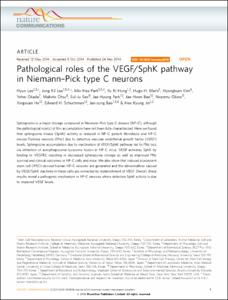Pathological roles of the VEGF/SphK pathway in Niemann-Pick type C neurons
- Keimyung Author(s)
- Park, Jae Hyung; Bae, Jae Hoon
- Department
- Dept. of Physiology (생리학)
- Journal Title
- Nature Communication
- Issued Date
- 2014
- Volume
- 5
- Issue
- 5514
- Abstract
- Sphingosine is a major storage compound in Niemann–Pick type C disease (NP–C), although
the pathological role(s) of this accumulation have not been fully characterized. Here we found
that sphingosine kinase (SphK) activity is reduced in NP–C patient fibroblasts and NP–C
mouse Purkinje neurons (PNs) due to defective vascular endothelial growth factor (VEGF)
levels. Sphingosine accumulation due to inactivation of VEGF/SphK pathway led to PNs loss
via inhibition of autophagosome–lysosome fusion in NP–C mice. VEGF activates SphK by
binding to VEGFR2, resulting in decreased sphingosine storage as well as improved PNs
survival and clinical outcomes in NP–C cells and mice. We also show that induced pluripotent
stem cell (iPSC)-derived human NP–C neurons are generated and the abnormalities caused
by VEGF/SphK inactivity in these cells are corrected by replenishment of VEGF. Overall, these
results reveal a pathogenic mechanism in NP–C neurons where defective SphK activity is due
to impaired VEGF levels.
- Publisher
- School of Medicine
- Citation
- Hyun Lee et al. (2014). Pathological roles of the VEGF/SphK pathway in Niemann-Pick type C neurons. Nature Communication, 5(5514), 1–17. doi: 10.1038/ncomms6514
- Type
- Article
- ISSN
- 2041-1723
- Appears in Collections:
- 1. School of Medicine (의과대학) > Dept. of Physiology (생리학)
- 파일 목록
-
-
Download
 oak-aaa-03816.pdf
기타 데이터 / 6.02 MB / Adobe PDF
oak-aaa-03816.pdf
기타 데이터 / 6.02 MB / Adobe PDF
-
Items in Repository are protected by copyright, with all rights reserved, unless otherwise indicated.